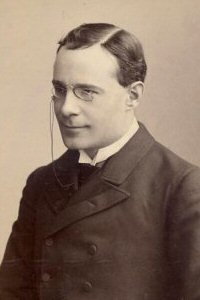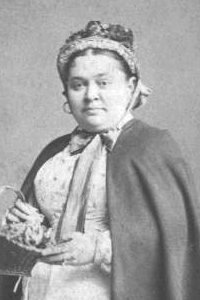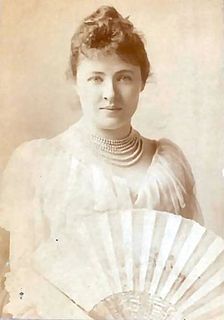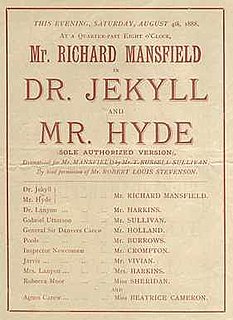Sophie Gimber Kuhn (8 November 1838 – 1867) was an English actress from Temple Bar, London who came to the United States on a visit with her parents. She performed at the Winter Garden Theatre in September 1860. Her first role was Nelly in All Hallow Eve. [1]

The English people are a nation and an ethnic group native to England who speak the English language. The English identity is of early medieval origin, when they were known in Old English as the Angelcynn. Their ethnonym is derived from the Angles, one of the Germanic peoples who migrated to Great Britain around the 5th century AD. England is one of the countries of the United Kingdom, and the majority of people living there are British citizens.
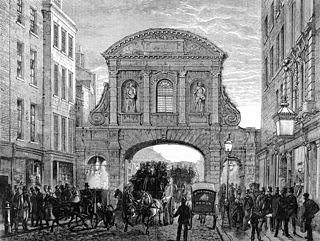
Temple Bar was the principal ceremonial entrance to the City of London on its western side from the City of Westminster. In the middle ages, London expanded city jurisdiction beyond its walls to gates erected across thoroughfares called, bars. Temple Bar is situated on the historic royal ceremonial route from the Tower of London to the Palace of Westminster, the two chief residences of the medieval English monarchs, and from the Palace of Westminster to St Paul's Cathedral. The road east of Temple Bar and within the City is Fleet Street, the road to the west, in Westminster, is The Strand. At Temple Bar the Corporation of the City of London formerly erected a barrier to regulate trade into the City. The 19th century Royal Courts of Justice are located next to it on its north side, having been moved from Westminster Hall. To its south is the Temple Church and the Inner Temple and Middle Temple Inns of Court. As the most important entrance to the City of London from Westminster, it was formerly long the custom for the monarch to halt at Temple Bar before entering the City of London, in order for the Lord Mayor to offer the Corporation's pearl-encrusted Sword of State as a token of loyalty.

The United States of America (USA), commonly known as the United States or America, is a country composed of 50 states, a federal district, five major self-governing territories, and various possessions. At 3.8 million square miles, the United States is the world's third or fourth largest country by total area and is slightly smaller than the entire continent of Europe's 3.9 million square miles. With a population of over 327 million people, the U.S. is the third most populous country. The capital is Washington, D.C., and the largest city by population is New York City. Forty-eight states and the capital's federal district are contiguous in North America between Canada and Mexico. The State of Alaska is in the northwest corner of North America, bordered by Canada to the east and across the Bering Strait from Russia to the west. The State of Hawaii is an archipelago in the mid-Pacific Ocean. The U.S. territories are scattered about the Pacific Ocean and the Caribbean Sea, stretching across nine official time zones. The extremely diverse geography, climate, and wildlife of the United States make it one of the world's 17 megadiverse countries.
In a production which opened on December 24, 1860, Kuhn played Lowenna in Rip Van Winkle by Washington Irving. The adaptation at the Winter Garden was produced by Joseph Jefferson, who played the part of Rip Van Winkle. [2] In 1863, along with Kate Denin [3] and Lucille Western, Kuhn performed in a stage adaptation of East Lynne at the old Academy of Music in Manhattan. [4]

"Rip Van Winkle" is a short story by the American author Washington Irving, first published in 1819. It follows a Dutch-American villager in colonial America named Rip Van Winkle who falls asleep in the Catskill Mountains and wakes up 20 years later, having missed the American Revolution. Irving wrote it while living in Birmingham, England, as part of the collection The Sketch Book of Geoffrey Crayon, Gent. The story is set in New York's Catskill Mountains, but Irving later admitted, "When I wrote the story, I had never been on the Catskills."

Washington Irving was an American short story writer, essayist, biographer, historian, and diplomat of the early 19th century. He is best known for his short stories "Rip Van Winkle" (1819) and "The Legend of Sleepy Hollow" (1820), both of which appear in his collection The Sketch Book of Geoffrey Crayon, Gent. His historical works include biographies of Oliver Goldsmith, Islamic prophet Muhammad, and George Washington, as well as several histories of 15th century Spain that deal with subjects such as Alhambra, Christopher Columbus, and the Moors.

Joseph Jefferson, commonly known as Joe Jefferson, was an American actor. He was the third actor of this name in a family of actors and managers, and one of the most famous of all 19th century American comedians. Jefferson was particularly well known for his adaptation and portrayal of Rip Van Winkle on the stage, reprising the role in several silent film adaptations. After 1865, he created no other major role and toured with this play for decades.




